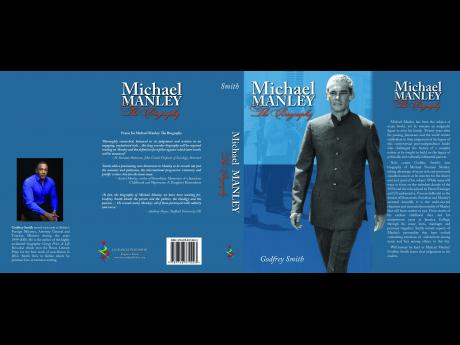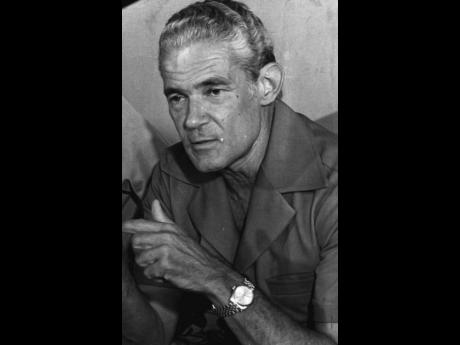Michael Manley: The Biography Part II
The days of Drumblair are gone; only those who experienced it will view it with a twinge of nostalgia. From that comfortable world, Manley emerges in the 1960s - a time of great change in Jamaica and globally, engulfed by the Cold War. That war was far from cold. This was a long and exhausting era of heated rhetoric, rumours, arguments, threats, conspiracy theories - and furious, conflicting ideologies. It was a bit like social media today, in fact! But this was the backdrop to Manley's earnest efforts to progress, to find a way that would benefit and empower the Jamaican people. He travelled through a troubled landscape that was not for the faint-hearted. Manley possessed the requisite courage.
The point is that we cannot simply pick up a figure like Michael Manley and transplant him into the 21st century; and this book does not attempt to evaluate his actions (and those of his contemporaries) by our modern standards. Truth be told, the Cold War era now seems light years away. With technological advances, society has taken a huge leap forward.
Having said that, the book portrays Manley's vision and the evolution of his ideas in a sensitive manner. Unlike many politicians today, Manley was a long-term thinker whose vision stretched beyond the next election cycle. Yet this book does not hesitate to note that many of his most far-reaching plans such as land reform were quickly derailed.
The book takes us in strict chronological sequence through Manley's life, without flashbacks or fast-forwards. The Prologue is a concise overview of Manley's life and times that illustrates the contrasts and contradictions embedded in them, opening with Manley returning from a pleasant evening at the White House with President George H.W. Bush in 1992 and contrasting it with the exciting days of his early acquaintance with Cuban President Fidel Castro - who remained a lifelong friend. This was a thought-provoking introduction, preparing us for the intense, at times almost roller coaster trajectory of Manley's career.
I enjoyed the short interludes in which the author "sets the scene" for memorable occasions. The sombre mood of Norman Washington Manley's funeral, and the electric atmosphere at the launch of the PNP's official campaign for 1980 in Sam Sharpe Square are described in a few short paragraphs.
PRIVATE LIFE
Apart from the intricacies of his political world, the book offers many glimpses into Manley's private life, updating the reader at regular intervals. He was married five times, and throughout four of these marriages he conducted affaires with other women - including, sometimes, the wives of close friends.
His relations with his children were at times strained by his absences and affected by his work. His colleagues and family suffered, not only from his womanising, but also from a ruthless streak. One example was his treatment of former Finance Minister David Coore, an old friend from childhood days.
Michael Manley was a man used to getting his own way. He was a charming, physically attractive, and charismatic man, indeed. He was a brilliant speaker, who had a mesmerising effect on the huge crowds who attended his meetings. He enjoyed praise and was hurt by criticism. Was he genuinely likeable? The book allows you to judge for yourself. But for politicians, expediency often rules the day.
The prime minister whom we meet in the Prologue, who maintained cordial relations with the United States, was "Michael Manley Mark II." This was the second edition, if you like, when he served as prime minister from 1989 to 1992. I found this latter section of the book particularly insightful as the author carefully dissects reactions from former supporters and colleagues on his drastically changed philosophy and new pragmatic approach.
At this point in the book, one senses that the author feels some sympathy towards Manley. He seems to suggest that during his last term in office - curtailed by illness - he was just doing his best in the face of a growing debt burden and the inevitability of another IMF agreement. He had damage control to do within his political party before stepping down and handing over to the ultimate political strategist, P.J. Patterson.
Democratic socialism was, by this time, a forgotten dream from a bygone era. Oh, how familiar this all sounds! The politics of disillusion, apathy, and broken ideals is a landscape that we are all familiar with, to this day.
The author answers some questions about Michael Manley's life that I have often pondered (one of which is, was he an "original"? Were his radical views his own or borrowed ideologies?) More questions arise, though, such as that annoyingly persistent query: What really was Manley's legacy?
Was it all worth it? His turbulent career could be regarded as an
ultimately unsuccessful experiment in socialism, with more
negative than positive impacts on Jamaican society. Did Manley really believe "socialism is love", or was he merely romancing the Jamaican public? Was he a "talker rather than a doer", as Professor Stone suggested?
ACHIEVEMENTS
The book summarises Manley's achievements, both tangible (and there were many, including the National Housing Trust, JAMAL, and others) and intangible. One, in Rex Nettleford's view, was what he called the "smadditization" of Jamaican society (the goodly professor was adept at coining these phrases). The book notes Nettleford's view: "Every jack man and woman in Jamaica now felt he or she was somebody because Michael had ripped away the colonial mindset of inferiority and imbued Jamaicans with a sense of confidence and self-worth. This was something no value could be placed upon." Self-reliance was the cornerstone of Manley's vision for Jamaica. Yet, has the Jamaican mindset reached this point (setting aside the inspiration of Usain Bolt)? This is one of many questions arising from this biography that we might like to examine in the cold, somewhat unforgiving light of the 21st century. How has our self-esteem been looking lately?
I wonder why no one has suggested that Michael Manley be nominated as a National Hero. One compelling reason might be that many Jamaicans, especially those in underprivileged communities, are still living in the atmosphere of political divisiveness that he - and others, on both sides - helped to foster.The book describes the distribution of land and housing along party lines and the PNP's association with political "enforcers" such as Burry Boy (Manley and his Cabinet ministers attended the latter's funeral in 1975, an action that Manley later conceded was unwise). In 1974, Manley publicly thanked them at a rally, calling them "my Paseros of the Garrison". Yes, did you know there was a Garrison gang? Of course, this was by no means limited to the People's National Party (PNP) side of the equation. Both parties aligned themselves with criminals.
Not surprisingly, in light of this, the average Jamaican is more wary of politicians nowadays. The book notes the disaffection with the Government that quickly emerged during Manley's second short stint as prime minister. In December 1989, sixty-six per cent of the population was dissatisfied with his administration after less than a year in office. The heady days of political activism were gone. Apathy set in. Fiery speeches would be to no avail now.
'internationalist'
Yet, reading about some of the extraordinary events of the period, one feels that progress has been made in governance. One could not imagine some of these dramatic (and undemocratic) events happening today: the state of emergency and imprisonment of opposition members, for example, or the National Executive Committee of the PNP overruling a Cabinet vote in 1980.
Similarly, one could not now envisage a prime minister travelling overseas at the drop of a hat - for a week or two at a time - to pursue his international agenda with like-minded political leaders of the time while his country flounders in an economic crisis. This "internationalist" aspect of Manley's career is described in detail in the book, which notes its importance for Manley. He convened an impressive group of world leaders, including Canadian Prime Minister Pierre Trudeau, at Runaway Bay Resort in 1978, demonstrating an ability to bring together powerful
leaders that "no other West Indian leader then or now could show", the author notes.
The book ends on a muted, thoughtful note with a vivid description of Manley's funeral. Did all the sound and fury of the 1970s signify nothing, after all? The book spins a complex web of inspiration, frustration, possibilities, and disappointments, following each other head over heels. It is a compelling narrative. I would recommend this book as a very readable account not only of the man and his ideas, but of the times he lived in. It's a piece of history, and as such, it's a
necessary and satisfying read.
Last week, the author of this review was incorrectly identified as Godfrey Smith and we apologise for any inconvenience caused.


